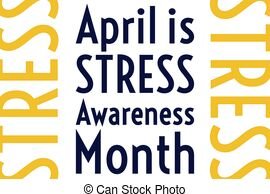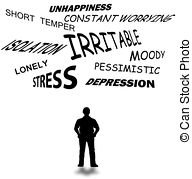
Stress Awareness Month dates back to 1992, but stress has been a concern from the time scientists Meyer Friedman and Ray Rosenman developed the Type A and Type B personality test, linking high stress lifestyles with heart disease. Stress seems to go hand in hand with modern society, with the ongoing pandemic providing an added layer of concern. But April is a time to learn ways to avoid stress and its negative effects.
What Is Stress?
Stress is the feeling of emotional or physical tension that is brought on by an existing factor, or “stressor.” There are two main types of stress: acute stress and chronic stress. The differences are:
- Acute stress is short term and goes away as the stressor is removed, such as when a car pulls in front of you unexpectedly, you slam on the brakes, and then continue driving away. It can also come on with a new experience. All people occasionally experience acute stress.

- Chronic stress can last for long periods of time. Common chronic stressors are money problems, unhappy relationships, and difficult school or work situations. For people who experience chronic stress, stress can become such a common part of life that it is sometimes not even recognized as a problem until it negatively affects their health.
Stress and Health
The body reacts to stress by releasing hormones in the brain that make you more alert, cause your muscles to tense, and increase your pulse. In acute stress situations, these reactions can help handle the situation causing the stress. Stress that is long term, however, can lead to health problems.
Common effects of chronic stress include:
- High blood pressure
- Heart disease
- Diabetes
- Obesity
- Depression or anxiety
- Skin disorders
- Menstrual problems
Signs that you are experiencing too much stress include:
- Headaches
- Frequent pains and aches
- Stomach upset
- Diarrhea or constipation
- Fatigue
- Lack of focus
- Change in sex drive
- Sleep problems
- Stiff jaw or neck
- Use of alcohol or drugs to relax
- An increase in tobacco use
- Weight loss or gain
Causes of Stress
Stress can come from positive challenges, such as a new baby, or negative situations, such as a broken relationship. Its effects vary from person to person and, at times, can even be societal. A case in point: It is hard to find a single human on the planet who is not affected by the stress the COVID-19 pandemic has brought on. The Centers for Disease Control and Prevention (CDC) says that it is natural to feel stress, anxiety, grief, and worry during this pandemic. 
Common sources of stress include:
- Getting married or divorced
- Death of a loved one
- Problems at home
- Losing a job
- Starting a new job
- Retiring
- Work problems
- Money problems
- Having a baby
- Moving
- Having a serious illness
People react to stress the way they do based on factors such as genetics and life experiences.
Ways to Cope with Stress
Managing stress can have health benefits. Stress management strategies include: 
- Getting regular physical activity
- Practicing relaxation techniques, such as deep breathing, meditation, yoga, tai chi, massage
- Taking breaks from current events, including those on social media
- Eating healthy meals
- Getting plenty of sleep
- Avoiding alcohol, tobacco, and drugs
- Continuing with routine preventive measures, such as vaccines, cancer screenings, dental exams
- Getting vaccinated to prevent COVID-19, when available
- Connecting with others
- Spending time on hobbies
- Keeping a sense of humor
- Connecting with community- or faith-based organizations
- Seeking professional counseling, when needed
- Volunteering
When to Seek Help
It is important to speak to a health-care provider if stress affects your daily activities for several days in a row. Unchecked, stress can lead to serious health problems, including depression and anxiety, and cardiovascular disease, such as high blood pressure, abnormal heart rhythms, heart attack, or stroke. It can also lead you to lash out at others or take your feelings out on yourself.
Get emergency help if you feel you cannot cope by calling 911 or reaching out to the following organizations:
- National Suicide Prevention Lifeline: 800-273-TALK (8255) for English and 888-628-9454 for Spanish or the Lifeline Crisis Chat
- National Domestic Violence Hotline: 800-799-7233 or text “LOVEIS” to 22522
- National Child Abuse Hotline: 800-4AChild (422-4453) or text to 800-422-4453
- National Sexual Assault Hotline: 800-656-HOPE (4673) or visit the online chat
- Veteran’s Crisis Line: 800-273-TALK (8255) or Crisis Chat
- Disaster Distress Helpline: Call or text 800-985-5990 (press 2 for Spanish)
- The Eldercare Locator: 800-677-1116
Visit the CDC website for more resources, including the food assistance program, teen depression information, and how to help children cope in emergencies.
In addition, there are several free stress management webinars available on YouTube. Google “stress management webinars” to access.
Herrick Library Resources
The following items can be requested and checked out of Herrick Library via curbside pickup or through the Libby app via OverDrive, where indicated*:
- *Burnout: The Secret to Unlocking the Stress Cycle, by Emily Nagoski and Amelia Nagoski
- How Big Are Your Worries, Little Bear?: A Book to Help Children Manage and Overcome Anxiety, Anxious Thoughts, Stress, and Fearful Situations, by Jayneen Sanders (picture book)
- *How to Quiet Your Mind: Relax and Silence the Voice of Your Mind Today!, by Marc Allen (electronic audiobook)
- One Nation Under Stress, with Sanjay Gupta (DVD)
- Stress Proof: The Scientific Solution to Protect Your Brain and Body—and Be More Resilient Every Day, by Mithu Storoni
Sources: American Institute of Stress, Stress Awareness Month—April 2020, https://www.stress.org/stress-awareness-month-april-2020#:~:text=Stress%20Awareness%20Month%20has%20been,awareness%20and%20education%20since%201992; CDC, COVID-19, Coping with Stress, https://www.cdc.gov/coronavirus/2019-ncov/daily-life-coping/managing-stress-anxiety.html; Mayo Clinic, Stress Management, https://www.mayoclinic.org/healthy-lifestyle/stress-management/in-depth/stress/art-20046037; MedlinePlus, Stress and Your Health, https://medlineplus.gov/ency/article/003211.htm;
Graphics: Can Stock Photo

